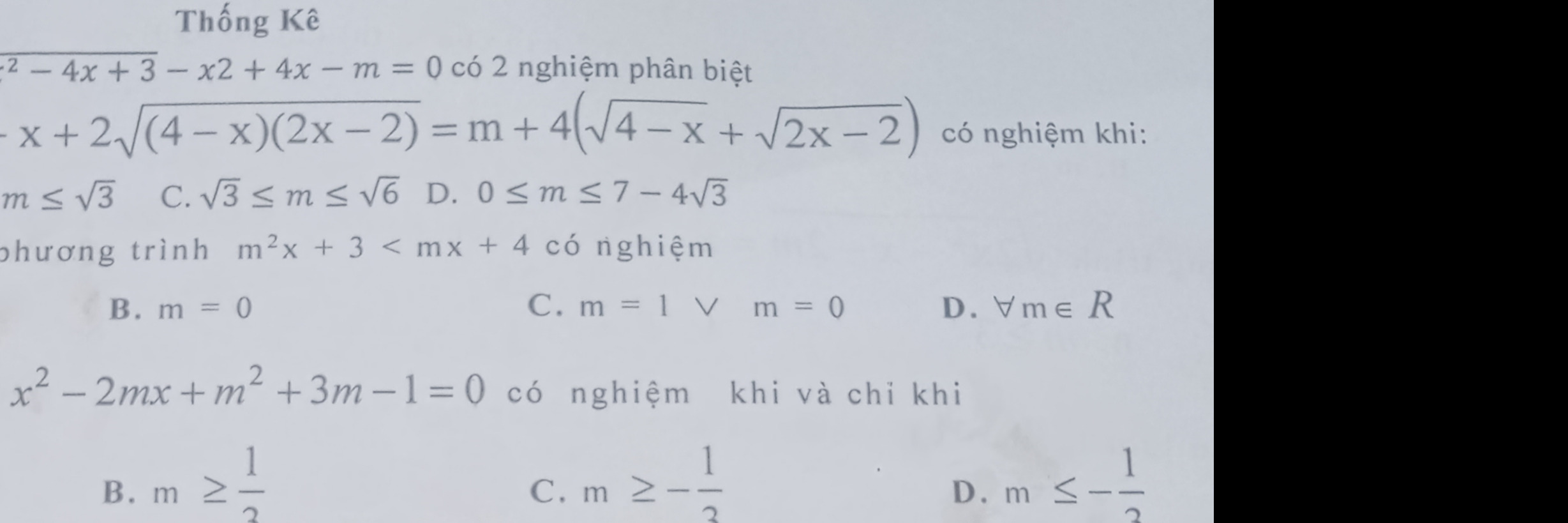Phương trình tích
3x2 - 4x - 4 = 0
Hãy nhập câu hỏi của bạn vào đây, nếu là tài khoản VIP, bạn sẽ được ưu tiên trả lời.


\(x^4+4x^3+5x^2-4x+4=0\)
\(\Leftrightarrow x^4+4x^3+4x^2+x^2-4x+4=0\)
\(\Leftrightarrow x^2\left(x+2\right)^2+\left(x-2\right)^2=0\)
Vì \(x^2\left(x+2\right)^2\ge0\forall x;\left(x-2^2\right)\ge0\forall x\)
\(\Rightarrow x^2\left(x+2\right)^2+\left(x-2\right)^2\ge0\)
Mà \(x^2\left(x+2\right)^2+\left(x-2\right)^2=0\)
\(\Rightarrow\hept{\begin{cases}x\left(x+2\right)=0\\x-2=0\end{cases}}\)
\(\Leftrightarrow\hept{\begin{cases}x=0;x=-2\\x=2\end{cases}}\)
Mà ko cùng một lúc tồn tại 2 giá trị của x
\(\Rightarrow\)Phương trình vô nghiệm
Vậy ...


\(4\left(sin^4x+cos^4x\right)+sin4x-2=0\)
\(\Leftrightarrow4\left(1-2sin^2x.cos^2x\right)+2sin2x.cos2x-2=0\)
\(\Leftrightarrow2-2sin^22x+2sin2x.cos2x=0\)
\(\Leftrightarrow2\left(1-sin^22x+sin2x.cos2x\right)=0\)
\(\Leftrightarrow2\left(cos^22x+sin2x.cos2x\right)=0\)
\(\Leftrightarrow2cos2x\left(cos2x+sin2x\right)=0\)
\(\Leftrightarrow\left[{}\begin{matrix}cos2x=0\\cos2x+sin2x=0\end{matrix}\right.\)
\(\Leftrightarrow\left[{}\begin{matrix}x=\dfrac{\pi}{4}+\dfrac{k\pi}{2}\\\sqrt{2}sin\left(2x+\dfrac{\pi}{4}\right)=0\end{matrix}\right.\)
\(\Leftrightarrow\left[{}\begin{matrix}x=\dfrac{\pi}{4}+\dfrac{k\pi}{2}\\x=-\dfrac{\pi}{8}+\dfrac{k\pi}{2}\end{matrix}\right.\)
Vậy phương trình đã cho có nghiệm \(x=\dfrac{\pi}{4}+\dfrac{k\pi}{2};x=-\dfrac{\pi}{8}+\dfrac{k\pi}{2}\)

3x2 + 2x - 1 = 0
=> 3x2 + 3x - x - 1 = 0
=> 3x(x + 1) - (x + 1) = 0
=> (3x - 1)(x + 1) = 0
=> \(\orbr{\begin{cases}3x-1=0\\x+1=0\end{cases}}\)
=> \(\orbr{\begin{cases}x=\frac{1}{3}\\x=-1\end{cases}}\)
x2 - 5x + 6 = 0
=> x2 - 2x - 3x + 6 = 0
=> x(x - 2) - 3(x - 2) = 0
=> (x - 3)(x - 2) = 0
=> \(\orbr{\begin{cases}x-3=0\\x-2=0\end{cases}}\)
=> \(\orbr{\begin{cases}x=3\\x=2\end{cases}}\)
3x2 + 7x + 2 = 0
=> 3x2 + 6x + x + 2 = 0
=> 3x(x + 2) + (x + 2) = 0
=> (3x + 1)(x + 2) = 0
=> \(\orbr{\begin{cases}3x+1=0\\x+2=0\end{cases}}\)
=> \(\orbr{\begin{cases}x=-\frac{1}{3}\\x=-2\end{cases}}\)
1, \(3x^2+2x-1=0\Leftrightarrow3x^2+3x-x-1=0\)
\(\Leftrightarrow3x\left(x+1\right)-\left(x+1\right)=0\)
\(\Leftrightarrow\left(x+1\right)\left(3x-1\right)=0\)
\(\Leftrightarrow\orbr{\begin{cases}x+1=0\\3x-1=0\end{cases}\Leftrightarrow\orbr{\begin{cases}x=-1\\x=\frac{1}{3}\end{cases}}}\)
2, \(x^2-5x+6=0\Leftrightarrow x^2-2x-3x+6=0\)
\(\Leftrightarrow x\left(x-2\right)-3\left(x-2\right)=0\)
\(\Leftrightarrow\left(x-2\right)\left(x-3\right)=0\)
\(\Leftrightarrow\orbr{\begin{cases}x-2=0\\x-3=0\end{cases}\Leftrightarrow\orbr{\begin{cases}x=2\\x=3\end{cases}}}\)
3, \(3x^2+7x+2=0\Leftrightarrow3x^2+6x+x+2=0\)
\(\Leftrightarrow3x\left(x+2\right)+\left(x+2\right)=0\)
\(\Leftrightarrow\left(x+2\right)\left(3x+1\right)=0\)
\(\Leftrightarrow\orbr{\begin{cases}x+2=0\\3x+1=0\end{cases}\Leftrightarrow\orbr{\begin{cases}x=-2\\x=-\frac{1}{3}\end{cases}}}\)

Đáp án D
* Xét phương trình : x 2 – 4 x + 4 = 0
⇔ ( x - 2 ) 2 = 0 ⇔ x - 2 = 0 ⇔ x = 2
Vậy phương trình này có nghiệm duy nhất.
Để hai phương trình đã cho có nghiệm chung khi và chỉ khi x = 2 là nghiệm phương trình
x 2 + ( m + 1 ) x + m = 0 .Suy ra:
2 2 + ( m + 1 ) . 2 + m = 0
⇔ 4 + 2m + 2 + m = 0 ⇔ 6 + 3m = 0
⇔ 3m = -6 ⇔ m = -2

3x2 - 4x - 4 = 0
<=> 3x2 - 6x + 2x - 4 = 0
<=> 3x(x - 2) + 2(x - 2) = 0
<=> (3x + 2)(x - 2) = 0
<=> \(\orbr{\begin{cases}3x+2=0\\x-2=0\end{cases}}\Rightarrow\orbr{\begin{cases}x=-\frac{2}{3}\\x=2\end{cases}}\)
Vậy \(x\in\left\{-\frac{2}{3};2\right\}\)là nghiệm phương trình
3x2 - 4x - 4 = 0
<=> 3x2 - 6x + 2x - 4 = 0
<=> 3x( x - 2 ) + 2( x - 2 ) = 0
<=> ( x - 2 )( 3x + 2 ) = 0
<=> x - 2 = 0 hoặc 3x + 2 = 0
<=> x = 2 hoặc x = -2/3
Vậy tập nghiệm của phương trình là S = { 2 ; -2/3 }